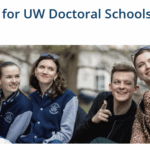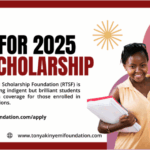AfricaLics – the African Network for Economics of Learning, Innovation and Competence Building Systems – is looking for suitable PhD student candidates from universities in African countries to participate in the AfricaLics PhD Visiting Fellowship Programme (2023 cohort).
Application Deadline: 15th September 2022
Eligible Countries: African countries
To be taken at:
About the Award: The programme previously allowed successful candidates a study period of five months based at the Department of Political Science, Faculty of Social Science, Aalborg University, Denmark.
Under the AfricaLics Visiting Fellowship Programme successful candidates will be provided with the opportunity to participate in a one-year fellowship programme combining online pre- and post-activities with a study period of 3 months at University of Johannesburg in South Africa. Mentoring will be provided by a range of African and international scholars in Innovation and Development studies who are research active in AfricaLics and Globelics. The programme will be housed by the DSI/NRF/Newton Fund Trilateral Research Chair in Transformative Innovation, the Fourth Industrial Revolution and Sustainable Development (TRCTI) at University of Johannesburg. The chair also includes the African Centre for Technology Studies (ACTS) and Jaramogi Oginga Odinga University of Science and Technology (JOOUST) in Kenya and University of Sussex in UK. Please see: https://www.uj.ac.za/faculties/cbe/SARChI-TRCTI).
Within the AfricaLics community, innovation is broadly defined as spanning from “new to the world inventions” to the diffusion and use of technology new to the user or context in which it is introduced and includes competence building among users of innovation. Technology here can mean both a physical product; a new process e.g. for manufacturing a product and new way of doing or organising things. Innovation and Development Studies research as defined by the AfricaLics network includes the study and management of processes that link technological and social innovation with development. This includes studies and improved understandings of how learning and competence building systems contribute to development processes. For more info on the main thematic areas addressed by AfricaLics, please see: https://www.africalics.org/thematic-areas/.
Overall aim and organisation of the programme
The aim of the visiting fellowship programme and the scholarships is to help African PhD students working in the field of Innovation and Development to strengthen their academic/research qualifications; improve quality of their dissertations and prepare for a career in innovation and development either within academia or outside (e.g. in the private sector or in government/policy making).
The VFP does this by increasing the mobility and level of exposure of the PhD students to international knowledge in the field of innovation and development. The programme forms part of the efforts by AfricaLics to contribute to the development of a vibrant research community in Africa in this emerging and highly multidisciplinary field. The Swedish International Development Agency, Sida (Stockholm), has so far provided funding for the visiting scholarships as part of the project Enhancing research capacity on Innovation and Development in Africa through the African Network on Learning, Innovation and Competence Building Systems (AfricaLics) – Phase II (2017-2022). Discussions are ongoing with Sida about continuation of the VFP activities as part of a Phase III application that is under evaluation and decision on funding is expected in late 2022.
The AfricaLics secretariat (hosted by the African Center for Technology Studies – please see: https://www.acts-net.org/) is responsible for the project with the AfricaLics Scientific Board providing advice on scientific matters and issues of strategic importance. The AfricaLics PhD VFP 2023 is organized jointly by the AfricaLics secretariat through ACTS and UJ-TRCTI with participation of other relevant African and international universities active in the field of Innovation and Development. Mentors for the programme will be carefully selected to ensure best possible match with the successful PhD visiting fellows.
Type: Fellowship
Eligibility:
Applicants for the AfricaLics PhD visiting fellowship programme should:
- Be enrolled as a PhD student at a university in Africa.
- Have completed their first year of studies by December 2022
- Have a background (BSc, MSc etc.) within Economics, Sociology, Political Science, Science and Technology Policy, Geography, History or Development Studies. Applicants may also work within the STEM (science, technology, engineering or mathematics) subjects or even manufacturing but from a social science perspective.
- Possess adequate skills in English (documentation may be requested).
- Be working actively on a subject relevant to the field of innovation and development as defined above.
- Submit a brief application 1 page/500 words explaining own background, motivation for applying and expected outcomes of participation in the AfricaLics PhD visiting fellowship programme
Selection Criteria: Applicants for the AfricaLics PhD visiting fellowship programme should:
- Be enrolled as a PhD student at a university in Africa.
- Have completed their first year of studies by December 2022 (upgrade/probation)
- Scholars in the field may have a background in economics and/or other social sciences (e.g. Sociology, Political Science, Science and Technology Policy, Geography, History or Development Studies), but some also work within the STEM (science, technology, engineering or mathematics) subjects or even manufacturing. They work within a broad range of areas including energy and sustainable development/transformation, health, gender, agriculture, manufacturing and work organisation, big data and the fourth industrial revolution.
- Possess adequate skills in English (documentation may be requested. Language tests that are accepted are listed on the AAU web-page:http://www.en.aau.dk/education/apply/master/admission-requirements/#ar3
- Be working actively on a subject relevant to the field of innovation and development as defined above.
- Submit a brief application 1 page/500 words explaining own background, motivation for applying and expected outcomes of participation in the AfricaLics PhD visiting fellowship programme
Number of Awards: 4
Value of Program:
The visiting scholarship will provide students with time off from duties in their home country to focus on analyzing data collected from fieldwork and writing up articles or chapters for their PhD thesis. Students will also do presentations of their project work to and benefit from interaction with faculty members and fellow PhD students working on innovation and development issues at the Faculty of Social Science at Aalborg University and other relevant scholars engaged in the AfricaLics VFP.
The visiting scholarship will provide students with time off from duties in their home country to focus on consolidating and improving their research, analysing data collected from fieldwork and writing up articles or chapters for their PhD thesis. Students will also do presentations of their project work and benefit from interaction with other visiting fellows and PhD students working on innovation and development issues scholars at JOOUST/the Trilateral Chair and the pool of mentors from the AfricaLics and Globelics network dedicated to work with the AfricaLics Visiting Fellowship Programme.
The study stay will also include possibilities for participating in a limited number of PhD courses (online and/or face-to-face) deemed of particular relevance for the student.
During the fellowship period, each student will be “matched” with one or two scholars with competences in the field in which the student is active. These matched scholars will act as mentors for the PhD visiting fellows. In this way, the AfricaLics Visiting Fellowship Programme help build research capabilities in the field of Innovation and Development drawing on internationally renowned scholars in the field. Final selection of mentors depends on the topic and background of successful applicants.
Mentors on the AfricaLics PhD VFP are not formal supervisors and hence full responsibility for the PhD study process remains with the PhD student and his/her supervisors from the university where the student is enrolled. This must be a university in Africa. Close interaction between the PhD student, home supervisor and the mentors are required to make sure the study stay contributes in a constructive manner to the studies of the PhD student. Hence, the PhD candidate must organize trilateral meetings and e-mail exchanges between the PhD student, the main supervisor from the home institution and the students’ AfricaLics designated mentors. Meetings will mostly take place through Zoom, but if the situation allows at least one meeting will be a face-to-face meeting as home supervisors and mentors visit their students in Kenya for in-depth discussions on progress made by the PhD student and discussions on research and research capacity building in the field of Innovation and Development in Africa more generally.
Participation in the AfricaLics PhD Visiting Programme should form part of the wider PhD study plan for each applicant, which typically will include various elements such as:
- Initial theoretical studies/taught courses and fieldwork in home country/country where the student is already enrolled as a PhD student (first year must have been concluded by December 2021).
- Maximum of four months study visit to JOOUST to focus on writing up thesis or articles that are part of the PhD thesis.
- Participation in AfricaLics VFP seminars organised as part of the study visit (introduction seminar, paper presentation seminars, other courses and a final seminar).
- Participation in relevant PhD training activities such as the 2022 AfricaLics PhD Academy, collective courses organised by AfricaLics under the programme and one or two carefully selected PhD training courses (online or face-to-face). PhD candidates are responsible for applying to such courses and academies themselves following agreement with their home-supervisors, mentors and the AfricaLics PhD VFP academic coordinator).
- AfricaLics PhD visiting fellows are encouraged to work on and submit papers to up-coming relevant conferences such as e.g. the AfricaLics Conference 2022 and the 18th Globelics conference 2023. Participation in such activities provides exposure to the wider Globelics/AfricaLics community. It is the responsibility of the PhD candidates themselves to apply for participation in such events.
- Return to home country and continue work on PhD dissertation in order to finalize and submit.
The visiting fellowship period includes both online activities before and after the four months of study visit to JOOUST, but we also encourage students to remain engaged with the AfricaLics network after the fellowship period ends as AfricaLics alumni. Former participants in the AfricaLics VFP are listed on the AfricaLics website (see: https://www.africalics.org/vfp-alumni/). AfricaLics VFP alumni meet occasionally online or in connection with key events and plans for the establishment of a more formalised AfricaLics PhD alumni network are tabled for 2022.
Duration of Program: The visiting scholarship provides successful PhD students with the opportunity to study at University of Johannesburg in South Africa for a maximum of 3 months. The study stay is scheduled to take place from 1st September 2023 to 30th November 2023. Students should arrive on 1st September 2023 to be able to settle and participate in introductory activities early in September 2023.
How to Apply:
Applicants for the AfricaLics PhD visiting fellowship programme should:
- Be enrolled as a PhD student at a university in Africa.
- Have completed their first year of studies by December 2022
- Have a background (BSc, MSc etc.) within Economics, Sociology, Political Science, Science and Technology Policy, Business, Geography, History or Development Studies. Applicants may also work within the STEM (science, technology, engineering or mathematics) subjects, technology management or even manufacturing but from a social science perspective.
- Possess adequate skills in English (documentation may be requested).
- Be working actively on a subject relevant to the field of innovation and development as defined above.
- Submit a brief application 1 page/500 words explaining own background, motivation for applying and expected outcomes of participation in the AfricaLics PhD visiting fellowship programme.
The application must be accompanied by the following documents:
- Brief outline of your current PhD project including training plan (max. 5 pages). Please ensure to:
- Be clear on the theoretical and conceptual frameworks you are using in your research.
- Carefully stipulate your research questions making sure that these research questions are clear and focused.
- Stipulate evidence that you intend to address each of your research questions
- Clearly specify the sources of the data/information that you will use to obtain the evidence that you require.
- Explain how you intend to go about collecting this evidence (using e.g. interviews; data bases, surveys etc.)
- Curriculum Vitae – CV (including PhD courses attended so far)
- Letter of support from the main PhD supervisor confirming that the PhD student will have completed her/his upgrade/probation/ proposal defense by end December 2022
- Letter of support from the University Administration at the university where the PhD student is enrolled
- Copies of academic certificates (copies of Bachelor and Master Certificates as a minimum)
- One writing sample (article or chapter) from current PhD program
You are NOT expected to submit a copy of your passport when applying for the PhD visiting fellowship programme. If you are offered the scholarship, you will be asked to handle any visa issues that may be relevant yourself. Collection of personal data will be kept at a minimum, stored safely and will not be used for any other purposes.
Applications with all relevant attachments should be forwarded to visitingphd@africalics.org by 23.00hrs East Africa time (EAT) on 15th September 2022.
Applications not fulfilling the requirements above will not be considered, so please forward any questions you may have to visitingphd@africalics.org and you will be assisted.
Successful candidates will be notified by mid December 2022, following which they will be required to confirm their interest (sign study agreement form) and deal with any issues related to visa issues and access to South Africa.
Visit Program Webpage for details









